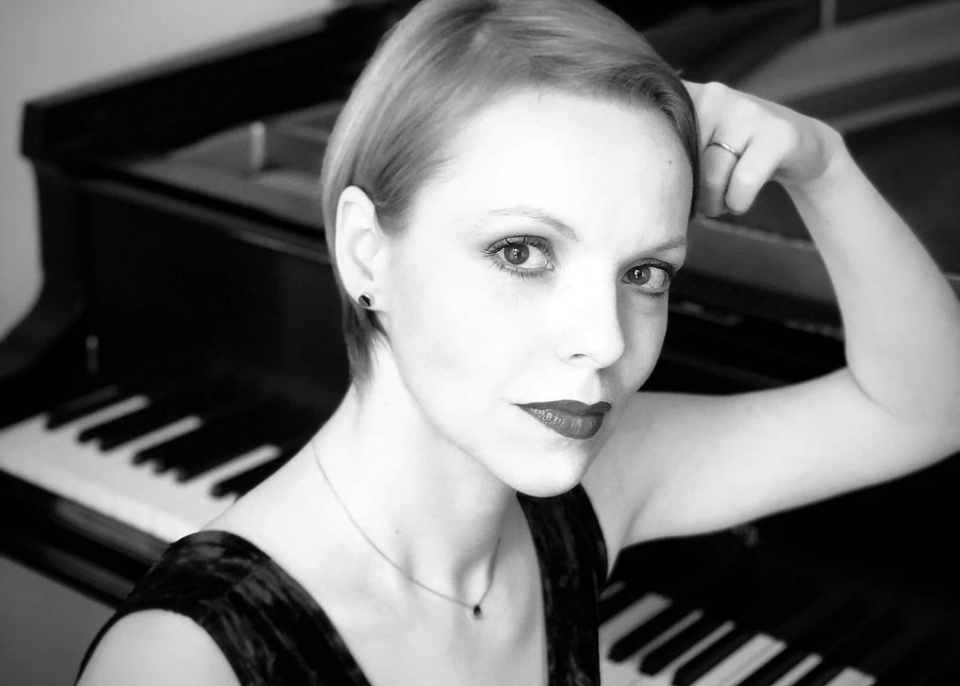
Courtesy Magdalena Stern-Baczewska
ianist Magdalena Stern-Baczewska was sent to her first piano lesson at age 5 as punishment for being mean to her little sisters. Still, it was unlikely she would have chosen another career path — Stern-Baczewska grew up in Katowice, Poland, to a family of pianists and singers. “It was a no-brainer,” she says. “I was playing even before I started formal lessons. But my teacher made me sensitive to beautiful sounds from the very first lesson.”
Stern-Baczewska now shares that gift as the director of Columbia’s Music Performance Program (MPP), a position she’s held since 2014. She teaches a performance master class for student musicians, as well as Music Humanities as part of the Core Curriculum.
Stern-Baczewska was performing in Warsaw when she was recruited by a professor at the Mannes School of Music, at The New School. She demurred, but the professor persisted, checking in with her months later. “That phone call changed my life,” she says. She arrived in New York City for auditions in 1998. “I was living from one miracle to another, and I loved every minute of it,” she says. Stern-Baczewska earned bachelor’s and master’s degrees from Mannes and a doctor of musical arts degree from the Manhattan School of Music.
“I think we are conditioned as young musicians to dream of becoming performers and practice in hopes of becoming a big star,” she says. “But I was always open to teaching.” Stern-Baczewska gave private lessons to children, was an adjunct at the College for one semester in 2011, led chamber music ensembles at Mannes and taught at Montclair State in New Jersey before returning to Columbia. She also spent four years working at Yamaha Corporation of America, which she says gave her the necessary skills to run a program such as MPP.
“It’s been five years and I still pinch myself,” she says. “My colleagues are fantastic, and being able to help students — the majority of whom are not music majors — pursue their passion on a high level is a true privilege.” More than 300 students receive music instruction through MPP. “They’re there because they love it,” Stern-Baczewska says. “They’re not locking themselves up practicing to be the next great soloist — they’re all about interactions with others, building relationships, making music together. It inspires me every day.”
Her “Master Class” is a focused seminar for a dozen student performers, including those from the Juilliard-Columbia program who take music instruction at Juilliard and the remainder of their classes at the College. The students perform for the group and receive high-level critique from each other. “They are truly superhuman,” Stern-Baczewska says. “And they appreciate the experience of being able to verbalize their thoughts.”
Teaching non-performers in the Music Humanities setting is even more rewarding for her. “I learn so much from my students; I don’t have to fear them being close-minded or unaccepting, even with more ‘difficult’ music,” she says. “They always find a way for it in their world, and they help me into it as well. A new chemistry is created in every session.”
“There is constant discussion about inclusivity in Music Hum,” she continues. “We’re talking about the masterpieces of Western music, but I try to make sure that what the students hear and see in terms of performances is diversified. I don’t want classical music to feel elitist, and we can connect music to issues we face today — for example, we talk about anti-Semitism when we discuss Wagner. It can be intense, but the students say they’re glad we’re having those discussions.”
Last summer, Stern-Baczewska joined Professor Robert E. Harrist Jr. GSAS’81 in Paris at Reid Hall for a linked session of Art Hum and Music Hum. The combined program, which launched in 2015, lasts six weeks and includes daily classes and cultural events. Stern-Baczewska, who has performed around the world, also recently played a concert at the Columbia Global Center in Beijing, inviting two students from the MPP to join her. “Being able to share this experience with MPP students was a big milestone,” she says.
When not teaching or performing, Stern-Baczewska studies Chinese —
her eighth language — and she and her husband, an ear, nose and throat physician specializing in sleep, enjoy attending the Met Opera, dancing at silent discos and binging on Netflix (“we’re watching Narcos right now; it’s our way to decompress”). The two met collaborating on a set of recordings that would help his patients fall asleep, creating three volumes called Music For Dreams. “It was a fascinating process because I had to find new ways to interpret the music in order to provide therapeutic benefit. My job is usually to keep people alert and engaged!”


